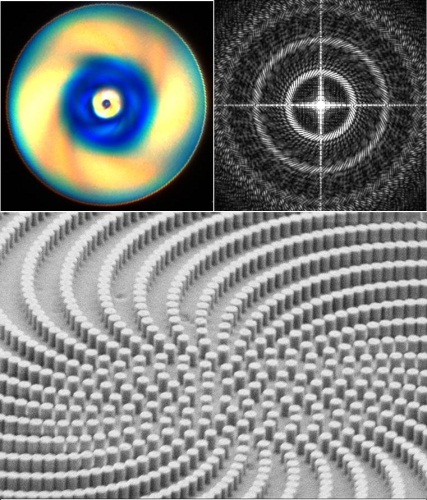Deterministic Aperiodic Structures for on-chip nanophotonics and nanoplasmonics device applications

The specific goal of this project is to create, design and engineer novel metal-dielectric structures which can provide broadband enhancement of light-matter interaction over a wide angular spectrum (insensitivity to the direction of incident fields). This is being achieved using the unique attributes of Deterministic Aperiodic Nano Structures (DANS) and by studying their ultimate performances, both theoretically and experimentally, in relation to: (a) the enhancement and the control of radiative optical processes in semiconductors; (b) the enhancement of non-linear optical processes in metal nanostructures; (c) the demonstration of wide-spectrum, angle-insensitive light scattering for energy harvesting applications and plasmonic-enhanced solar cells; (d) the engineering of reproducible substrates for label-free biosensing using Surface Enhanced Raman Scattering (SERS) DANS substrates with single-molecule sensitivity.
Currently we are investigating a special kind of DANS which simultaneously lack translational and orientational symmetries in real space, while displaying continuous circular symmetry (i.e., rotational symmetry of infinite order) in reciprocal Fourier space. These structures are known as Vogel spirals, which are a subset of Fermat Spirals. These patterns are frequently encountered in the spatial arrangement of leaves, bracts and florets, most notably as in the seeds of a sunflower.
We combine experimental dark-field scattering, imaging and fluorescence spectroscopy with rigorous electrodynamics calculations in order to investigate light scattering phenomena in Vogel’s spiral arrays of Au nanoparticles and dielectric nanopillars. In particular, we investigate the novel regime of “circular multiple light scattering” in finite-size deterministic structures and we experimentally and theoretically have shown that circular symmetry in diffused reciprocal space gives rise to polarization-insensitive planar diffraction over a controllable range of wavelengths. We believe that the study of plasmonic nanoparticle and photonic pillar arrays with aperiodic spiral order will lead to the engineering of novel optical devices that dramatically benefit from polarization insensitive, enhanced light-matter coupling on planar surfaces, such as thin-film plasmonic solar cells, photo-detectors, biosensors, and novel polarization devices.